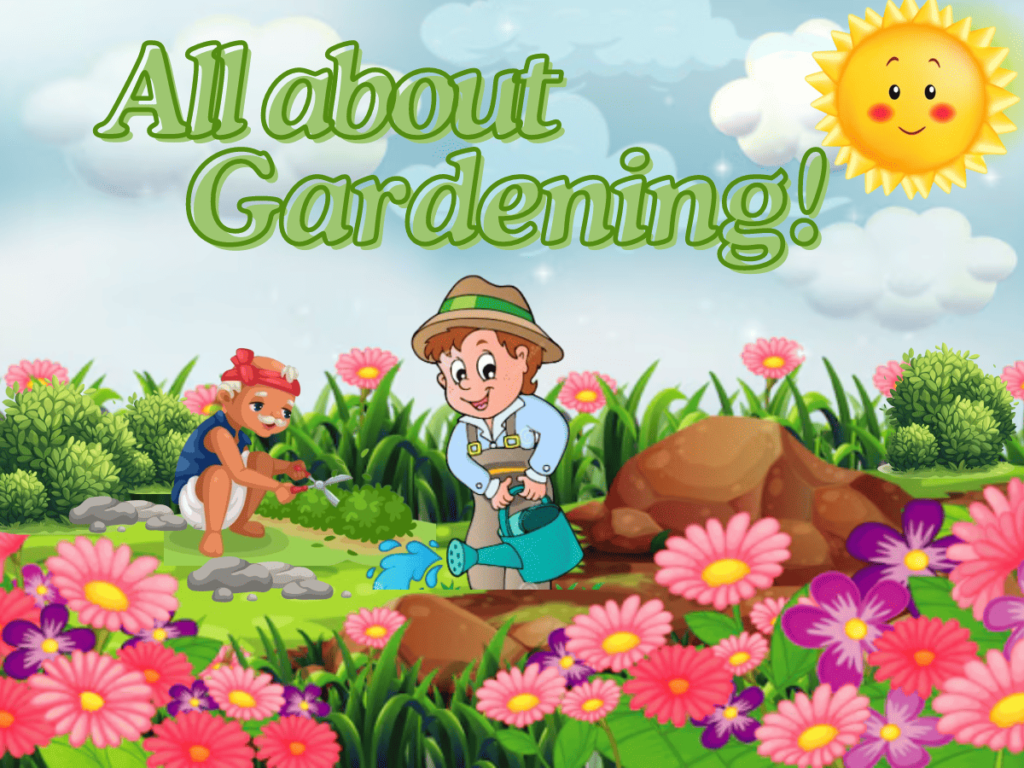
Table of Contents
25 Essential Words Related to Gardening
Gardening is a rewarding and therapeutic activity that connects us with nature. Whether you’re a novice gardener or a seasoned horticulturist, understanding these 25 essential gardening terms will enhance your gardening experience and help you create a flourishing garden.
1. Compost
– Pronunciation: /ˈkɒmpɒst/
– Part of Speech: Noun
– Meaning: A mixture of decayed organic matter used to fertilize and improve soil.
– Usage:
1. Adding compost to the soil improves its fertility.
2. She started a compost pile in her backyard.
3. Compost helps retain moisture in the soil.
4. The garden thrived after using homemade compost.
– Common Prepositions: “in,” “with”
2. Mulch
– Pronunciation: /mʌltʃ/
– Part of Speech: Noun
– Meaning: A material spread over soil to retain moisture and suppress weeds.
– Usage:
1. Mulch keeps the soil cool and moist.
2. Applying mulch reduces weed growth.
3. She chose organic mulch for her flower beds.
4. Mulch adds a finished look to the garden.
– Common Prepositions: “with,” “on”
3. Pruning
– Pronunciation: /ˈpruːnɪŋ/
– Part of Speech: Noun
– Meaning: The act of trimming plants to improve their growth.
– Usage:
1. Regular pruning keeps the roses healthy.
2. Pruning encourages new growth.
3. She spent the afternoon pruning the shrubs.
4. Pruning removes dead and diseased branches.
– Common Prepositions: “of,” “with”
4. Germination
– Pronunciation: /ˌdʒɜːrmɪˈneɪʃən/
– Part of Speech: Noun
– Meaning: The process by which a seed develops into a new plant.
– Usage:
1. Germination rates depend on the seed quality.
2. Proper conditions are essential for germination.
3. They monitored the germination of the vegetable seeds.
4. Germination began within a week.
– Common Prepositions: “of,” “for”
5. Transplant
– Pronunciation: /ˈtrænzplænt/
– Part of Speech: Verb
– Forms: Transplant, transplants, transplanting, transplanted
– Meaning: To move a plant from one location to another.
– Usage:
1. They transplanted the seedlings into larger pots.
2. Transplanting is best done in the evening.
3. She carefully transplanted the young trees.
4. Transplanting can shock delicate plants.
– Common Prepositions: “into,” “from”
6. Fertilizer
– Pronunciation: /ˈfɜːrtəlaɪzər/
– Part of Speech: Noun
– Meaning: A substance added to soil to enhance plant growth.
– Usage:
1. Organic fertilizer is beneficial for the garden.
2. They applied fertilizer to the vegetable patch.
3. Fertilizer should be used sparingly.
4. The plants flourished after using a balanced fertilizer.
– Common Prepositions: “for,” “with”
7. Weed
– Pronunciation: /wiːd/
– Part of Speech: Noun
– Meaning: A wild plant growing where it is not wanted and in competition with cultivated plants.
– Usage:
1. Weeds can quickly overrun a garden.
2. Pulling weeds is a necessary gardening chore.
3. They used mulch to suppress weed growth.
4. Weeds were removed before planting the new flowers.
– Common Prepositions: “in,” “of”
8. Harvest
– Pronunciation: /ˈhɑːrvɪst/
– Part of Speech: Verb
– Forms: Harvest, harvests, harvesting, harvested
– Meaning: To gather crops when they are ripe.
– Usage:
1. They harvested the tomatoes in late summer.
2. Harvesting lettuce can be done throughout the season.
3. She enjoyed harvesting fresh herbs from her garden.
4. The corn was harvested at its peak ripeness.
– Common Prepositions: “in,” “from”
9. Perennial
– Pronunciation: /pəˈrɛniəl/
– Part of Speech: Noun
– Meaning: A plant that lives for more than two years.
– Usage:
1. Lavender is a popular perennial.
2. They planted perennials for lasting color.
3. Perennials require less maintenance than annuals.
4. The garden features a variety of perennials.
– Common Prepositions: “in,” “of”
10. Annual
– Pronunciation: /ˈænjuəl/
– Part of Speech: Noun
– Meaning: A plant that completes its life cycle in one year.
– Usage:
1. Marigolds are a common annual.
2. They planted annuals for seasonal color.
3. Annuals need to be replanted each year.
4. The garden was filled with vibrant annuals.
– Common Prepositions: “in,” “of”
11. Soil
– Pronunciation: /sɔɪl/
– Part of Speech: Noun
– Meaning: The top layer of earth in which plants grow.
– Usage:
1. Rich soil is key to a healthy garden.
2. They tested the soil before planting.
3. Good soil structure supports plant roots.
4. Adding compost improves soil quality.
– Common Prepositions: “in,” “of”
12. Trowel
– Pronunciation: /ˈtraʊəl/
– Part of Speech: Noun
– Meaning: A small hand tool with a pointed, scoop-shaped blade, used for digging.
– Usage:
1. She used a trowel to plant the seedlings.
2. A trowel is essential for small gardening tasks.
3. They bought a new trowel for the garden.
4. The trowel made it easy to dig holes for bulbs.
– Common Prepositions: “with,” “for”
13. Hoe
– Pronunciation: /hoʊ/
– Part of Speech: Noun
– Meaning: A long-handled tool used for weeding and breaking up soil.
– Usage:
1. He used a hoe to remove weeds.
2. A hoe is useful for cultivating soil.
3. They bought a sturdy hoe for the garden.
4. The hoe helped to aerate the soil.
– Common Prepositions: “with,” “for”
14. Irrigation
– Pronunciation: /ˌɪrɪˈɡeɪʃən/
– Part of Speech: Noun
– Meaning: The supply of water to land or crops to help growth.
– Usage:
1. They installed an irrigation system in the garden.
2. Proper irrigation is essential during dry seasons.
3. Drip irrigation conserves water.
4. Irrigation keeps the plants healthy.
– Common Prepositions: “of,” “for”
15. Pollination
– Pronunciation: /ˌpɒlɪˈneɪʃən/
– Part of Speech: Noun
– Meaning: The transfer of pollen from male to female parts of flowers to produce seeds.
– Usage:
1. Bees are vital for pollination.
2. Pollination increases fruit yield.
3. Wind and insects aid in pollination.
4. The garden was designed to attract pollination.
– Common Prepositions: “of,” “for”
16. Nursery
– Pronunciation: /ˈnɜːrsəri/
– Part of Speech: Noun
– Meaning: A place where plants are grown and sold.
– Usage:
1. They bought new plants from the nursery.
2. The nursery offers a wide variety of perennials.
3. She worked at a local nursery.
4. The nursery provided expert gardening advice.
– Common Prepositions: “at,” “from”
17. Greenhouse
– Pronunciation: /ˈɡriːnhaʊs/
– Part of Speech: Noun
– Meaning: A glass building used to grow plants in controlled conditions.
– Usage:
1. The greenhouse extends the growing season.
2. They grew tomatoes in the greenhouse.
3. A greenhouse protects plants from harsh weather.
4. She enjoys working in the greenhouse.
– Common Prepositions: “in,” “from”
18. Horticulture
– Pronunciation: /ˈhɔːrtɪˌkʌltʃər/
– Part of Speech: Noun
– Meaning: The art or practice of garden cultivation and management.
– Usage:
1. He studied horticulture at university.
2. Horticulture involves a variety of techniques.
3. They applied horticulture principles to their garden.
4. Horticulture is both a science and an art.
– Common Prepositions: “of,” “in”
19. Loam
– Pronunciation: /loʊm/
– Part of Speech: Noun
– Meaning: Rich, fertile soil that is a mixture of sand, silt, and clay.
– Usage:
1. Loam is ideal for growing plants.
2. They added loam to improve soil structure.
3. Loam retains moisture and nutrients well.
4. The garden beds were filled with loam.
– Common Prepositions: “of,” “with”
20. Pesticide
– Pronunciation: /ˈpɛstɪsaɪd/
– Part of Speech: Noun
– Meaning: A substance used to destroy pests.
– Usage:
1. They used a natural pesticide to protect the crops.
2. Pesticides can be harmful if overused.
3. She chose an organic pesticide for the garden.
4. Pesticides help control insect infestations.
– Common Prepositions: “with,” “for”
21. Topsoil
– Pronunciation: /ˈtɒpsɔɪl/
– Part of Speech: Noun
– Meaning: The uppermost layer of soil, rich in nutrients.
– Usage:
1. They added topsoil to the garden beds.
2. Good topsoil is crucial for plant health.
3. The topsoil was eroded by heavy rain.
4. They spread topsoil evenly over the lawn.
– Common Prepositions: “with,” “of”
22. Cultivate
– Pronunciation: /ˈkʌltɪˌveɪt/
– Part of Speech: Verb
– Forms: Cultivate, cultivates, cultivating, cultivated
– Meaning: To prepare and use land for crops or gardening.
– Usage:
1. They cultivated the land for a vegetable garden.
2. Cultivating the soil improves its quality.
3. She enjoys cultivating different types of flowers.
4. The farmer cultivated the field with care.
– Common Prepositions: “with,” “for”
23. Propagation
– Pronunciation: /ˌprɒpəˈɡeɪʃən/
– Part of Speech: Noun
– Meaning: The process of growing new plants from seeds, cuttings, or other plant parts.
– Usage:
1. Propagation is essential for plant reproduction.
2. They practiced propagation using cuttings.
3. Successful propagation requires proper techniques.
4. The greenhouse specializes in plant propagation.
– Common Prepositions: “of,” “through”
24. Seedling
– Pronunciation: /ˈsiːdlɪŋ/
– Part of Speech: Noun
– Meaning: A young plant, especially one raised from seed and not yet transplanted.
– Usage:
1. The seedlings were ready for transplanting.
2. She nurtured the seedlings in small pots.
3. Seedlings need adequate light to grow strong.
4. They planted the seedlings in the garden.
– Common Prepositions: “of,” “from”
25. Vermicompost
– Pronunciation: /ˈvɜːrmɪˌkɒmpɒst/
– Part of Speech: Noun
– Meaning: Compost produced by the digestion of organic matter by worms.
– Usage:
1. Vermicompost enriches the soil with nutrients.
2. They started a vermicompost bin in the garage.
3. Using vermicompost improved plant growth.
4. Vermicompost is an excellent organic fertilizer.
– Common Prepositions: “of,” “with”
Short Story Using All 25 Words
Emma loved her garden and spent every spare moment nurturing it. She began by adding compost to the soil, ensuring a fertile base for her plants. To retain moisture and prevent weeds, she spread mulch around her flower beds. Regular pruning of her roses kept them healthy and vibrant.
In spring, she was delighted to see the germination of the seeds she had planted. As the seedlings grew, she carefully transplanted them into larger pots. To boost their growth, she applied organic fertilizer and diligently removed any weeds that appeared.
When it was time to harvest her vegetables, she marveled at the bounty. Her garden was a mix of perennials and annuals, providing beauty and variety throughout the year. She tested her soil regularly to ensure it had the right balance of nutrients.
With her trusty trowel, she planted new bulbs, and used a hoe to aerate the soil. An efficient irrigation system kept her garden well-watered, and she ensured proper pollination by planting flowers that attracted bees.
Visits to the local nursery were a treat, where she found new plants to add to her greenhouse. Her interest in horticulture grew as she experimented with different techniques. She enriched her soil with loam and used natural pesticides to keep pests at bay.
Adding fresh topsoil to her garden beds each season, she continued to cultivate her land with care. She enjoyed the process of propagation, creating new plants from cuttings. Her seedlings thrived under her watchful eye, eventually becoming robust additions to her garden.
Using vermicompost produced by her worms, Emma saw remarkable improvements in her plants. Her garden was a testament to her dedication and knowledge of gardening, each plant a symbol of her hard work and love for the earth.
***
By familiarizing yourself with these essential gardening terms, you can enhance your enhance your speaking skills!
Other Posts, you might be interested in…

Your vlog is very good it helps people who want to know things they don’t know
https://main7.top/obama/
Pingback: 25 Advanced Vocabulary Words: Instantly Boost Communication